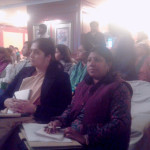The conference, which took place at the Observer Research Foundation on the 17th Dec 2014, gathered together a team of over thirty experts drawn from varied fields such as economics, energy ecology, social sciences, hydraulics and environmental sciences from the China, India, Nepal, Bangladesh, Thailand, Cambodia, Vietnam, Laos and Myanmar.


In line with the global focus on the role of water as a driver of sustainable growth and the convergent conditions of the Mekong and Ganga regions, the key areas of the Mekong Ganga Dialogue 2014 have been:
- Water supply, sanitation and hygiene;
- Regional water resources and energy governance;
- Climate change adaptation; and
- Regional cooperative frameworks.
The conference acknowledged that universal access to safe water, sanitation and hygiene (WASH) is crucial for the elimination of poverty, and brought forward recommendations for the promotion of WASH related projects.
Manuela Puricelli and Amitabh Kumar from Centre for Social Research brought a gender perspective in the discourse around water & sustainable behaviours, addressing the urge to run water conservation and water sanitation training for the men and women living by the Ganga. That would not only help tackling health and social issues, but it will also preserve the ecosystem of the river.
Attendees also talked about the fine balance between right of the people and right of the river, and the need to work at grassroot level to bring behavioural changes which contribute to protect the eco system. The panel stressed the importance of strengthening transnational relations between neighbouring countries, and tried to drawn a framework for interregional cooperation aiming at solving common ecological, social and economic issues.




